This is topic Super 8 versus DVD screen shots in forum 8mm Forum at 8mm Forum.
To visit this topic, use this URL:
https://8mmforum.film-tech.com/cgi-bin/ubb/ultimatebb.cgi?ubb=get_topic;f=1;t=003308
Posted by Paul Adsett (Member # 25) on December 12, 2007, 11:37 AM:
Just as an interesting experiment I decided to take comparative screen shots of the DVD and Super 8 print of 'Meet Me in St. Louis'. The dvd and super 8 were projected onto the identical size 5 ft wide matt white screen, and photographed using the same camera. Digital projector was a Panasonic 700, and S8 projector was a Eumig 938 with a f1.0 lens. Processing of the shots to enable posting on this forum was identical for both DVD and S8 shots, and no color enhancement was carried out. I think the shots show quite well the different characteristics of S8 film versus DVD. Which do you prefer?
SHOT 1 DVD
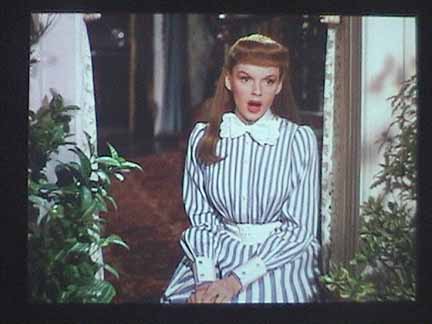
SHOT 1 SUPER 8
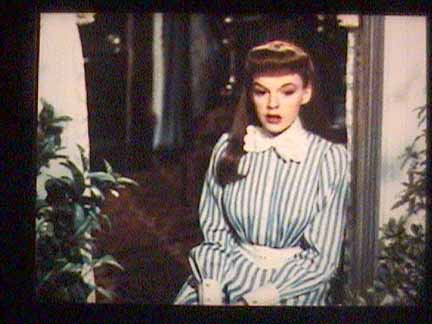
SHOT 2 DVD
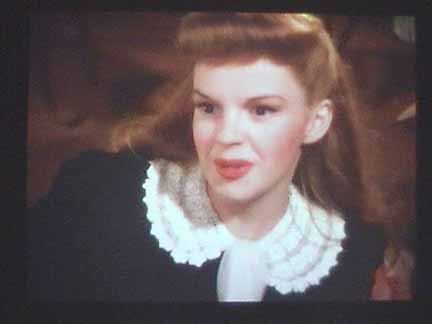
SHOT 2 SUPER 8
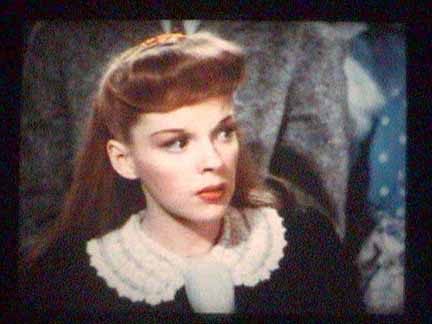
SHOT 3 DVD
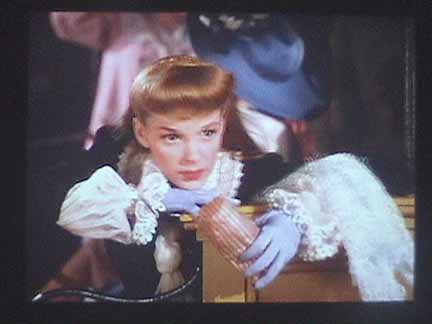
SHOT 3 SUPER 8
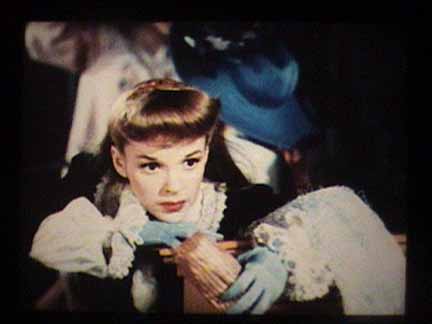
Having watched both versions of the film, my conclusion is that the DVD is sharper, but the S8 print has much better contrast, and the color is much more beautiful, much more Technicolor like, on the super 8 print. Also when you do a direct comparison, the DVD looks strangely 'flat' compared with S8,- can't quite put my finger on that.
Anyway 'Meet Me in St Louis' is a truly wonderful film to see either way, and it really does look great on S8. ![[Wink]](wink.gif)
[ December 12, 2007, 12:40 PM: Message edited by: Paul Adsett ]
Posted by Alan Rik (Member # 73) on December 12, 2007, 12:03 PM:
I noticed the exact same thing when I was re-recording the sound of Beauty and the Beast. In the scene where the petals are falling off the rose in the intro the DVD was sharper but the Super 8 Print had a really nice luminous quality to it that eluded the DVD.
I call it "magical"!
Posted by Graham Ritchie (Member # 559) on December 12, 2007, 12:39 PM:
Hi Paul
Shot 1 DVD looks much better, with a more natural look than the Shot 1 Super8, which appears to be towards the red. likewise the same with Shot 2 DVD which is a nice image of Judy Garland, well I am afraid in this case the DVD wins out,....oh oh thats me banned from the forum ![[Wink]](wink.gif)
![[Wink]](wink.gif)
Graham. ![[Smile]](smile.gif)
Posted by Paul Adsett (Member # 25) on December 12, 2007, 12:53 PM:
Hi Graham,
Look at Judy's eyebrows in shot 3. I think that captures the deeper blacks of the S8 print compared with the DVD.
Your punishment for your comment is to sit through 10 consecutive showings of 'The Rose' 400ft digest! ![[Big Grin]](biggrin.gif)
Posted by Lee Mannering (Member # 728) on December 12, 2007, 01:33 PM:
I agree Alan. When doing re-recordings and running the projected picture next to a decent Sony monitor here itís amazing what a difference between DVD & Super 8 prints in many ways. The thing I notice most is the amount of cropping that goes on from DVD versions of films against some of the Super 8 features when run side by side. The most obvious image difference is when projecting full scope Super 8 and you own a 16:9 cropped DVD. I soon realised how much 8mm had to offer to the Scope enthusiast.
Posted by Mal Brake (Member # 14) on December 12, 2007, 01:56 PM:
Hi Paul
I too have the Panasonic 700 so I am interested to know which setting the projector was on, as you are well aware apart from the 7 basic settings we can alter the contast and brightness of each individual colour to suit our taste and/or characteristic of a dvd.
I recently screened the same film [dvd] on an 8ft screen to some senior citizens and they loved it.
regards
Mal
Posted by Paul Adsett (Member # 25) on December 12, 2007, 03:46 PM:
Hi Mal,
I have the Panasonic settings as follows:
Picture Mode: Normal
Contrast: +15
Brightness: -10
Color:0
Tint:0
Color Temp: 0
Tint:0
Sharpness :0
Advance Menu settings: all zero
Posted by Osi Osgood (Member # 424) on December 12, 2007, 04:21 PM:
Looking at the comparison, I definitely see a much more saturated color spectrum to the film print. I feel the same about that "flat" feel to DVD. I think it could be the compression and how much info is used on screen for each frame of film, while you of course have all the info on each frame of film.
While the DVD is no doubt taken from a 35MM master, (probably), I'm struck as to just how sharp that Super 8mm is in comparison.
Sure DVD's are cheaper, but we Super 8mm (and 16MM) collectors have the "cadillac" versions of the films; more expensive, you bet, but worth every penny to the discernible viewer!
Posted by Mark Todd (Member # 96) on December 12, 2007, 04:53 PM:
I`ve personally never even had 16mm to get near to my modest video projectors I use now. I`d pop the colour up a bit Paul.
Also the panasonic has quite a soft image compared to others like say the Sanyo Z5 which is far sharper and better in some ways. The panasonic smooth screen thing spoils them a bit.
I think if you tried out the new 100AX panny which is far sharper and brighter and amazing contast you would be astonished at the difference over the 700.
The 700 is good for what it does but the VPs out now you have to see to believe.The prices now are so low for the aamzing quality.
I know someone who has just bought a new one with 2 years gaurantee for peanuts at 1 and 1/4 super 8 new features and they are in to film but the qaulity on those is awesome.
My best VP cost me £65 posted with a new bulb( 2000 hrs)a philips XGA B.sure and the picture is beautiful at 8 feet at 5 its stunning, its a 1600 lumens model but as more film pic based its not as high in real terms.
WE are a bit lucky here in the UK/Europe etc as pal tends to look better and sharper projected than NTSC usually too.
Don`t get me wrong film is wonderful but usual DVD on a cheap up to date VP is stunnigly good and HD-dvd on a HD projector is like 3D and incredible!!!!!!
Against the last 2 years stuff its unfair on film to have to even try to stand up to it, its not what its about really is it, film is something special.
Best Mark.
Posted by Paul Adsett (Member # 25) on December 12, 2007, 05:14 PM:
Bear in mind Mark that we are on the NTSC (Never The Same Color Twice) system here in the USA, and if I drive the color up for one DVD it is probably going to be oversaturated for some other DVD. I do not want to fiddle with the color menu from one DVD to the next, so I have it set at a point that looks good for just about all DVD'S. I have no doubt that PAL DVD'S may be a lot better in terms of color consistency from disc to disc.
You are exactly right of course about today's DVD projection quality, which is quite stunning, and I would not want to be without it. But I think it says a lot for super 8 that this 25 year old print can certainly hold its own against the latest technology, in terms of visual and audio enjoyment of the film. This is not a bashing DVD post, just an interesting comparison of the media. And, at least on this particular comparison, I think super 8 comes out very well.
Posted by Mark Todd (Member # 96) on December 12, 2007, 05:44 PM:
I agree Paul for the age of the thing its amazing, over 100 years old and still does great.
Theres a magical charm all of its own built in but image wise it is a struggle really with how things are going.
Yes I think Pal is a lot better really, some pal dvds you can push the colour well up and the image just gets better.
I think its a cost thing really, good super 8 projector and really good feature and you are away but if you are youngish with nippers its a hard job on that front now really.
For us though it can be the best of both worlds much as I love what my vieo projector gives me( just got the DVD of forbidden planet Ive never seen it and comes with loads of other trailers etc too) I simply will never stop loving film, Ive tried to stop too often and now stopped trying to stop !!!!
Best Mark.
PS I bought the long version Fellowship of the Ring trailer on 16mm earlier in the year and that is super and dvd will never touch it in terms of the buzz it gives me.
Posted by Graham Ritchie (Member # 559) on December 13, 2007, 12:50 AM:
Hi Paul
Its been an interesting comparison I looked at both Shot3 DVD and Shot3 Super8, and the question is,? which one is true technicolor, ![[Roll Eyes]](rolleyes.gif) on the DVD, the gloves Judy is wearing is "aqua", on the Super8 its "lavender", also the dress and hat in the background are different, my bet its the DVD
on the DVD, the gloves Judy is wearing is "aqua", on the Super8 its "lavender", also the dress and hat in the background are different, my bet its the DVD ![[Wink]](wink.gif) I better get used to watching "The Rose"
I better get used to watching "The Rose" ![[Wink]](wink.gif)
Graham. ![[Smile]](smile.gif)
PS, my wife picked out the colours.
[ December 13, 2007, 02:58 AM: Message edited by: Graham Ritchie ]
Posted by John Clancy (Member # 49) on December 13, 2007, 03:08 AM:
In more recent times I've been watching more video, laser disc and DVD in my home cinema than film. But when I run a film I enjoy the whole process much more. On Monday night I ran my 35mm print of 'Alien'. As so often happens when I put a film on (any gauge) I completely lose interest with video projection for a while. Now I've got a yen to watch my Super 8 print of 'Aliens'. Okay the clarity won't be as good as 35mm but you can be sure the light output will be better. And I won't have to change reels every 20 minutes or so.
However good home video projection becomes it will never have the magic of running that tactile film print that you sought out many years before. Each print has a history personal to the owner. A video on the other hand is simply a modern, throw-away item that has little longevity of interest.
Posted by James N. Savage 3 (Member # 83) on December 13, 2007, 08:56 AM:
Paul-
Thanks for that neat comparison!
You know, some really interesting points have been made on this thread. And I think the bottom-line is that, no matter how good technology gets, there's just something about watching actual film that defies logic. To compare picture quality with side by side screen shots, its almost impossible to get a fair discussion with someone who doesn't have the opportunity to watch projected films (aside from going to the multiplex). The depth and richness just can't be caught in a digital photograph. Although, I must say, Paul's photographs come INCREDIBLY CLOSE.
Incidently, there was one super 8 print which I ran side by side with a DVD with some scenes where the DVD copy was much better than the super 8 print. In my copy of "The Abyss", while the underwater scenes are absolutely breath-taking in this scope print, some of the darker scenes inside of the underwater craft did not transfer well, and detailed expressions on actor's faces are barely visable on my super 8 print. But, in spite of this defect, I have only watched my DVD one time, while I run the super 8 print quite often.
So, again, we see that super 8 defies all logic! ![[Wink]](wink.gif)
NOTE: This defect on my super 8 print of "The Abyss", is exclusive to my print, as I know of other prints that don't have this problem. And even with the defect, I DO recommend this, as it should only be viewed in scope on the big screen!
James.
Posted by Tony Milman (Member # 7) on December 13, 2007, 01:34 PM:
Ummm,
Might buy a DVD projector
Anyone want a GS1200?
Posted by Mark Todd (Member # 96) on December 13, 2007, 02:43 PM:
I thought you had the chance of some hot ones from time to time Tony !!!
Best Mark.
Posted by Christopher Quinn (Member # 831) on December 13, 2007, 04:15 PM:
John, has the colour held up on your Alien 35mm? Most of the ones I’ve come across are badly faded Eastman, but I’ve been hoping that some have managed to survive the fade.
Posted by Kevin Faulkner (Member # 6) on December 13, 2007, 05:09 PM:
What I can see on those DVD shots is the edge enhancement which is why the DVD shots look sharper. It may be the photography but do I also detect some solarising in the highlights?
Kev.
Posted by Christopher Quinn (Member # 831) on December 13, 2007, 05:27 PM:
Are there forum restrictions on image resolution and size? If it were possible to post the pictures in their original size and with PNG compression, it would be a much better comparison. Overly compressed Jpegs tend to play havoc with film grain.
Posted by Dan Lail (Member # 18) on December 13, 2007, 05:28 PM:
Keep in mind that these DVD versions have been digitally restored. There is no fair comparison to a super 8 print from 25 years ago(considering the source print). You might do better comparing a DVD to a new Derann print.
[ December 14, 2007, 11:14 AM: Message edited by: Dan Lail ]
Posted by Robert Wales (Member # 502) on December 13, 2007, 05:35 PM:
To be fair, we are not really comparing something from identical source material even though the film is ST LOUIS in both cases. The print is from a 25 year-old film negative recreated from original Technicolor printing materials since Technicolor was no longer printing in their 3-strip IB process that existed when MEET ME IN ST. LOUIS was shot. I do think that when the studios began reprinting their old Technicolor classics in the newer, modern color processes in the 70's and 80's one of the flaws was frequently a picture that was just a little TOO contrasty . I'm just old enough to have seen some genuine Technicolor prints and can only say to those who haven't, that once seen you can never forget their look.
The DVD, like many of the old MGM three-strip Technicolor productions, was created just a few years ago in Warner Home Video's new 'Ultra-Resolution' process which takes the original 3 color separation masters for the film and uses sophisticated technology to perfectly align them and eliminate registration and fringing problems inherent in the matching of the three original color negatives which can age and shrink at various degrees over the years. The result, combined with modern optics produces an image of far greater clarity than was ever achieved originally using previous printing techniques. Combine this with some revisionist color timing by Warner Home Video and you end up with a very nice looking copy of the film that MAY be closer to the original look of the film than some are willing to admit. Film preservationist Robert Harris has written that anyone watching an original Technicolor print of GONE WITH THE WIND would be shocked at how muted the colors are, but at the time it was felt that extreme colors would be too hard on the eyes and it was only for later re-issues that the film gained the deeply saturated hues that we now associate with the film, and Technicolor in general.
So to me a fair comparison can only be made if both the DVD and the Super 8 print were both created from the same source material within a fairly recent period of time. Of course we are only expressing opinions here and there is really no 'right' or 'wrong' answer, just preference.
Posted by Alan Rik (Member # 73) on December 13, 2007, 07:27 PM:
so far i still like film.
![[Smile]](smile.gif)
Posted by Lee Mannering (Member # 728) on December 14, 2007, 03:35 AM:
Been following this one.
We have HD projection here for work use, but with a film print I tend to feel we have a slice of history before images were digitised and mucked about with. I do much video editing and a simple tweak which may seem a good idea to the person with the mouse in his hand can change colours dramatically away for the original intended look. Plus I like being a projectionist and my wife knows where I am. He.
Posted by Ugo Grassi (Member # 139) on December 14, 2007, 07:56 AM:
I think that photos are not a good way for a match film/DVD
When you get a photo to the screen where a film is playing, you capture one or two frames. It means the photo has the "optical informations" of one or two frames.
Well, now you have to considerate in the chemical cinema (real film) the optical informations are in different position in every frame. It's so by the random position of the grain.
In the digital cinema the optical informations are in the same position in every frame (every pixel has always the same position in the matrix).
Conlcusion: in the chemical cinema the quality of the image in one second is the result of the addition of the informations of 24 frames;
in the digital cinema the quality of the image is the result ONLY of the pixels number in the matrix.
Posted by John Whittle (Member # 22) on December 14, 2007, 10:36 AM:
There are a few historical considerations that you have to deal with in making these comparisons.
First and foremost: Film projection is subtractive color (yellow, magenta, cyan) and video projection (for want of a better term) is additive.
Second: In current technologies, film presents a full picture twice or three times and replaces it with another picture at a rate of 24 times a second (for sound). Current video systems (we'll leave out the old CRT projectors) display a constant image and only update changes in that image (this is true for LCD, LCOS and DLP systems).
Three source material: While the original picture was shot with a Technicolor three strip camera, Super 8 prints were made by MGM labs long after MGM stopped using Technicolor Labs. What they did in the 1970s was take the three strip negatives and make a CRI (color reversal internegative) which was used to make further negatives for 35mm and 16mm contact printing and Super8 reduction printing. The original Technicolor timings for the negative were not used (or supplied by Technicolor) since they would only have been used to expose the IB stock which would have been soaked with dye and pressed onto the print stock.
The current DVD version of this title was made with the original black and white printing elements (and Technicolor did full scene dupes on all records if a dissolve or fade occured in a scene so often a 1000 foot reel of Technicolor negative would consist of 500 feet of black and white dupe negative) combined on a special optical telecine which allowed alignment and correction to a level that was never possible in the original Technicolor process.
Video systems. In the United States current broadcast television signals are consistent with the NTSC system. NTSC stands for National Television Standards Committee (much like JPEG or JPG stands for Joint Photographic Expert Group and MPEG stands for Motion Photographic Expert Group). The DVD does not have an NTSC signal on it, the DVD player may make one and send it to the projector, but if the projector is connected with S-Video the subcarrier is not mixed with the video, if the projector is connected with component (another mis-nomer) then the basic parts of the signal are closer to their original state and if the projector and player are connected with DVI or HDMI, then the digital signal from the DVD is going directly to the digital proecessor of the projector.
It is the very fact that the DVD player can make up the output signal from the digital data that lets me have a player that can output either a Region 2 or Region 1 disc (PAL or NTSC regions) in a form that my digital TV set can display.
So with all that said, trying to judge contrast on Super8 vs DVD is pushing the limits of the film technology. Contrast is one of the hardest things to control in film duplication since you can't easily change gamma on color films without introducing color errors.
Eastman made an internegative film (7270) for making intermediate negatives from color reversal originals so industrial producers could use Eastman color print stock for large release print orders.
The stock suffered from a "hump" in the midrange of I think the blue dye. It was common to see Eastman color prints produced with this stock with "purple shadows". Trying to correct that would shift the color balance of the rest of the picture. Many labs in Hollywood opted to use the 7243 Eastman Intermediate film, but it was designed to make interpositives and internegative from Eastman color negative materials and thus it's dyes were matched to color negative materials with a dye mask. Since ECO (Ektachrome Commercial) didn't have a dye mask as a color reversal original material, another color error was introduced instead.
MGM labs eventually gave up on CRI (Color Reversal Intermediate film type 5269) and started using the newer Eastman Intermediate films instead. But there was and is a contrast build up. This is also the reason you can always "see a fade coming" when labs only used a one or two foot handle on effects and spliced them into the original camera negatives for printing. (You'll often also see a slight shift or size change since the effect required two dupes: one positive and one negative; and there was always a build up of errors in optical camera settings.)
Just some thoughts when you look at the screen shots--without dealing with camera, shutter speed, screen type, etc etc.
John
Posted by Lee Mannering (Member # 728) on December 14, 2007, 11:10 AM:
Crumbs John, that be technical.
Thank goodness Super 8 projectors are thread & play eigh !
Happy Chrimbo..
Posted by John Clancy (Member # 49) on December 16, 2007, 03:30 AM:
Well done Paul, this one has turned into a very interesting discussion.
Chris, the colours on my Alien print have not faded. In fact, apart from the 70mm I saw at the Odeon Marble Arch years ago I think it's the best copy I've ever seen. Though I have to confess, it's the director's cut of 2003! Still, for £123 including postage just after the film had finished its theatrical release it was too good an opportunity to miss!
Posted by Christopher Quinn (Member # 831) on December 16, 2007, 12:36 PM:
That was a hell of a bargain!
[ August 04, 2012, 05:49 AM: Message edited by: Christopher Quinn ]
Visit www.film-tech.com for free equipment manual downloads. Copyright 2003-2019 Film-Tech Cinema Systems LLC

UBB.classicTM
6.3.1.2






![[Wink]](wink.gif)
![[Wink]](wink.gif)
![[Wink]](wink.gif)
![[Smile]](smile.gif)
![[Big Grin]](biggrin.gif)
![[Roll Eyes]](rolleyes.gif) on the DVD, the gloves Judy is wearing is "aqua", on the Super8 its "lavender", also the dress and hat in the background are different, my bet its the DVD
on the DVD, the gloves Judy is wearing is "aqua", on the Super8 its "lavender", also the dress and hat in the background are different, my bet its the DVD ![[Wink]](wink.gif) I better get used to watching "The Rose"
I better get used to watching "The Rose" ![[Wink]](wink.gif)
![[Smile]](smile.gif)
![[Wink]](wink.gif)
![[Smile]](smile.gif)